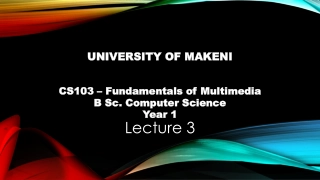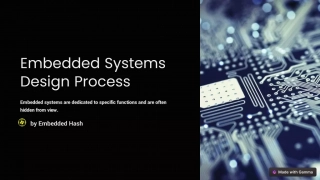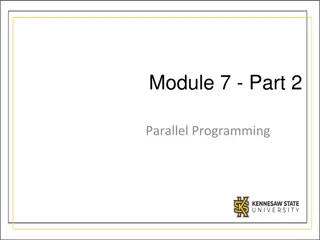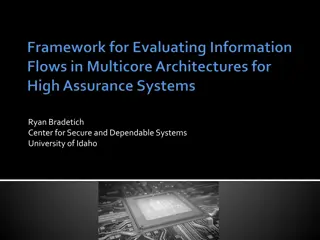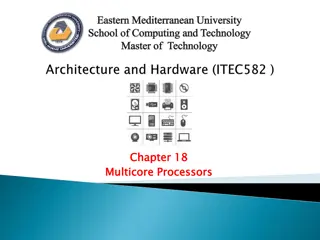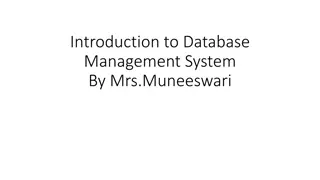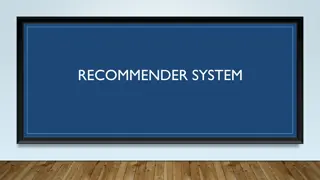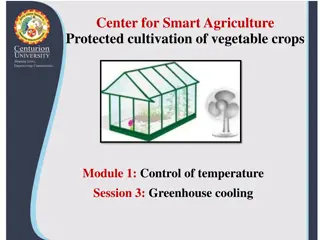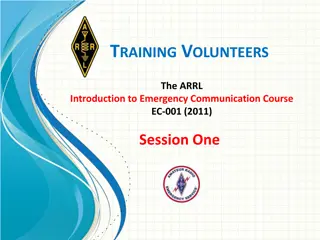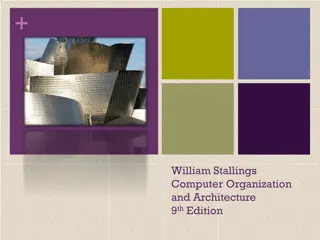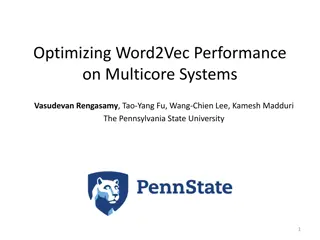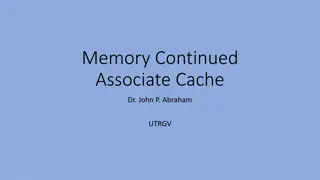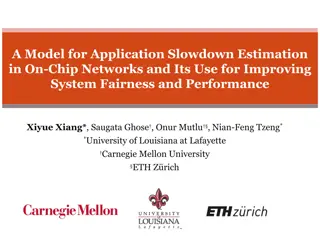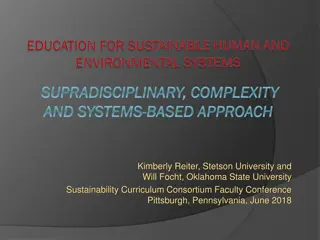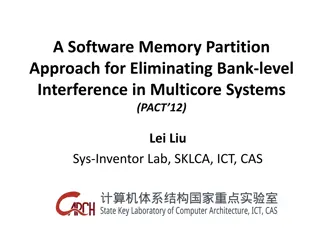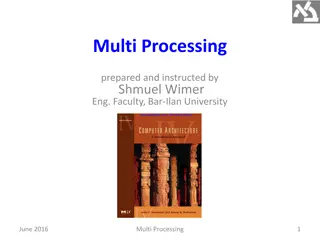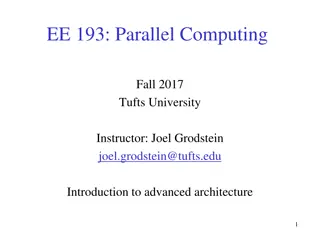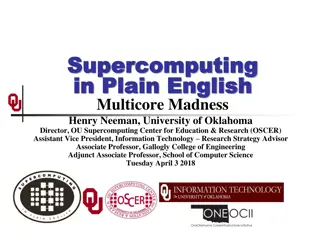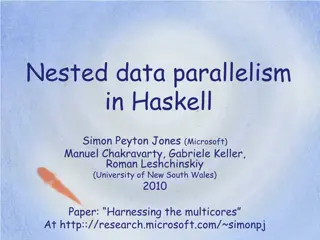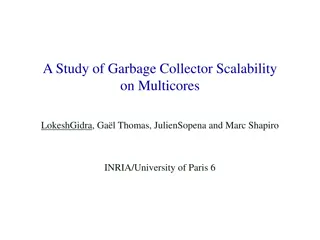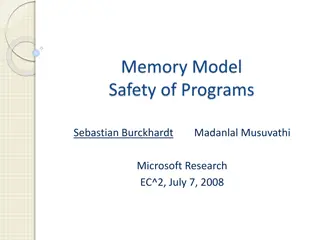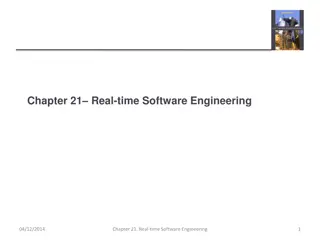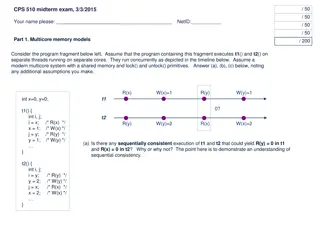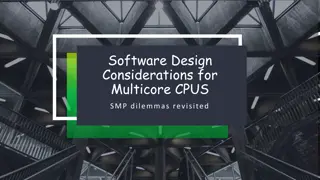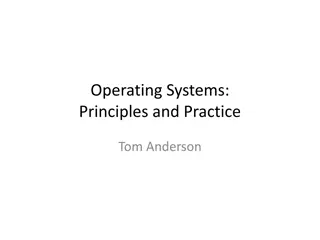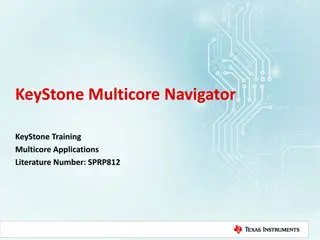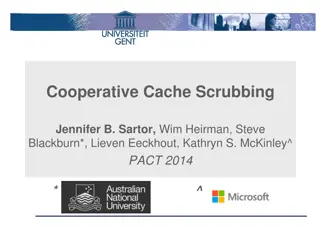Enhancing Food Systems for Improved Food Security and Job Creation
The importance of improving food systems to achieve sustainable development goals and enhance food security and job creation. It covers topics such as the current food systems, the impact of these systems, jobs in the food systems value chain, and key recommendations.
8 views • 24 slides
Understanding Multimedia Systems: Hardware and Software Components
Multimedia systems require specific hardware and software components to meet the demands of producing and playing multimedia content. Development systems are used for creating content with higher specifications, while playback systems are used for playing multimedia files with lower specifications.
8 views • 46 slides
Embedded Systems Design Process in the Embedded systems
Embedded systems are all around us, from the tiny microcontrollers in our household appliances to the sophisticated control systems in cars and aeroplanes. But how are these systems designed? Let's delve into the basics of the embedded systems design process in simple terms that anyone can understan
2 views • 9 slides
Evolution of Parallel Programming in Computing
Moores Law predicted the doubling of transistor capacity every two years, benefitting software developers initially. However, hardware advancements can no longer ensure consistent performance gains. Parallel computing, leveraging multicore architecture, has emerged as a solution to optimize performa
7 views • 10 slides
Overview of Distributed Systems: Characteristics, Classification, Computation, Communication, and Fault Models
Characterizing Distributed Systems: Multiple autonomous computers with CPUs, memory, storage, and I/O paths, interconnected geographically, shared state, global invariants. Classifying Distributed Systems: Based on synchrony, communication medium, fault models like crash and Byzantine failures. Comp
9 views • 126 slides
Operating Systems
An operating system is a crucial program that manages all other programs on a computer. It handles tasks like input recognition, file management, and device control. There are different types of operating systems such as single-user, single-task systems, multi-user, multi-task systems, real-time ope
6 views • 11 slides
Understanding Information Systems in Organizational Management
Management in organizations is divided into three levels: operational, tactical, and strategic. Each level requires different information systems to support various activities. Operational systems focus on routine transactions and control processes, while middle-level systems aid in semi-structured
9 views • 39 slides
Understanding Negative Results in Systems Research
Systems research encompasses various areas such as operating systems, networking, and distributed systems. Negative results in systems research often go unpublished, leading researchers to focus on curating positive outcomes. This practice can hinder the credibility of scientific findings and impede
5 views • 23 slides
Explore the Top 5 Trends in Alarm Systems with Shellharbour Security Systems
Explore the latest trends in alarm systems with Shellharbour Security Systems. Learn about advancements such as smart home integration, wireless technology, AI-powered monitoring, and more. Stay informed to enhance your home or business security with cutting-edge solutions. Visit: \/\/shellharbourse
7 views • 8 slides
Secure System Architecture Progression Framework Overview
Explore the evolution of secure system architectures, including multicore analysis and components like Cell Broadband Engine, Intel Core i, Freescale P4080. Dive into centralized processing systems, memory management, and hardware evaluations for improved processing power and security measures.
0 views • 30 slides
Understanding Multicore Processors: Hardware and Software Perspectives
This chapter delves into the realm of multicore processors, shedding light on both hardware and software performance issues associated with these advanced computing systems. Readers will gain insights into the evolving landscape of multicore organization, spanning embedded systems to mainframes. The
1 views • 36 slides
Introduction to Database Management System Explained
This presentation covers the basics of database management systems, including definitions of data, types of data, structured and unstructured data, storing data in computers using file systems and database systems, and issues with file systems like data redundancy, inconsistency, difficult data acce
1 views • 18 slides
Understanding Different Types of Recommender Systems
Recommender systems play a crucial role in providing personalized recommendations to users. This article delves into various types of recommender systems including Collaborative Filtering, Content-Based, Knowledge-Based, and Group Recommender Systems. Collaborative Filtering involves making predicti
0 views • 7 slides
Efficient Greenhouse Cooling Systems for Smart Agriculture
Active summer cooling systems like fan-and-pad and fog systems are crucial for maintaining optimal temperatures in greenhouses. These systems work by utilizing evaporation to remove heat from the air. Fan-and-pad cooling systems have been in use since 1954, where water is passed through pads to cool
1 views • 23 slides
Understanding Emergency Communication Systems for Volunteer Training
This content covers various topics related to emergency communication systems for volunteer training, including agency communication systems, government radio systems for police and fire departments, emergency medical radio systems, American Red Cross frequencies, and types of served-agency radio sy
2 views • 29 slides
Introduction to Embedded Systems Design
Embedded Systems Design, Chapter 1 provides an insightful overview of embedded systems, distinguishing them from general-purpose computers. The chapter delves into the characteristics of embedded systems, their design considerations, and the various types of embedded computers such as general-purpos
1 views • 7 slides
SmartNIC Offloading for Distributed Applications
This presentation discusses offloading distributed applications onto SmartNICs using the iPipe framework. It explores the potential of programmable NICs to accelerate general distributed applications, characterizes multicore SmartNICs, and outlines the development and evaluation process. The study c
0 views • 31 slides
Trends in Computer Organization and Architecture
This content delves into various aspects of computer organization and architecture, covering topics such as multicore computers, alternative chip organization, Intel hardware trends, processor trends, power consumption projections, and performance effects of multiple cores. It also discusses the sca
5 views • 28 slides
Optimizing Word2Vec Performance on Multicore Systems
This research focuses on improving the efficiency of Word2Vec training on multi-core systems by enhancing floating point throughput, reducing overheads, and avoiding any accuracy loss. The study combines optimization techniques to achieve parallel performance and evaluates the accuracy of the result
0 views • 30 slides
Efficient Dynamic Memory Management for Embedded Multicore Systems
This content delves into the challenges of dynamic memory management in embedded multicore systems, emphasizing the importance of transaction-friendly approaches. It covers parallel data structures, the role of operating systems/libraries, and principles of memory allocation. Through illustrations a
0 views • 24 slides
Fast Multicore Key-Value Storage Study
Explore Cache Craftiness for Fast Multicore Key-Value Storage in a comprehensive study on building a high-performance KV store system. Learn about the feature wishlist, challenges with hard workloads, initial attempts with binary trees, and advancements with Masstree. Discover the contributions and
0 views • 38 slides
Information Systems in Organizations: Overview and Implementation
Information systems play a crucial role in organizations, encompassing transaction processing systems, functional area information systems, and enterprise resource planning systems. This content delves into the purpose of transaction processing systems, the support provided by information systems ac
0 views • 30 slides
Understanding Cascade Control Systems in Industrial Processes
Cascade control systems play a crucial role in improving process control efficiency by incorporating feedback loops within feedback loops. This type of control architecture helps to better handle disturbances and variations in the process by creating secondary loops that monitor specific parameters.
0 views • 8 slides
Understanding Cache Memory in Computer Systems
Explore the intricate world of cache memory in computer systems through detailed explanations of how it functions, its types, and its role in enhancing system performance. Delve into the nuances of associative memory, valid and dirty bits, as well as fully associative examples to grasp the complexit
0 views • 15 slides
A Model for Application Slowdown Estimation in On-Chip Networks
Problem of inter-application interference in on-chip networks in multicore processors due to NoC contention causes unfair slowdowns. The goal is to estimate NoC-level slowdowns in runtime and improve system fairness and performance. The approach includes NoC Application Slowdown Model (NAS) and Fair
0 views • 25 slides
Sustainable Education for Human and Environmental Systems
Sustainable Education for Human and Environmental Systems (SHES) focuses on fostering sustainable societies through social learning and systems thinking. It aims to promote interconnectedness between human and environmental systems, with a vision of enhancing well-being while maintaining the viabili
0 views • 19 slides
A Software Memory Partition Approach for Eliminating Bank-level Interference in Multicore Systems
Memory requests from different threads can cause interferences in DRAM banks, impacting performance. The solution proposed involves partitioning DRAM banks between threads to eliminate interferences, leading to improved performance and energy savings.
0 views • 32 slides
Understanding Multi-Processing in Computer Architecture
Beginning in the mid-2000s, a shift towards multi-processing emerged due to limitations in uniprocessor performance gains. This led to the development of multiprocessors like multicore systems, enabling enhanced performance through parallel processing. The taxonomy of Flynn categories, including SIS
0 views • 46 slides
Understanding Advanced Computer Architecture in Parallel Computing
Covering topics like Instruction-Set Architecture (ISA), 5-stage pipeline, and Pipelined instructions, this course delves into the intricacies of advanced computer architecture, with a focus on achieving high performance by optimizing data flow to execution units. The course provides insights into t
0 views • 12 slides
Supercomputing in Plain English: Multicore Madness Workshop Details
Prepare for the "Supercomputing in Plain English: Multicore Madness" workshop with important instructions such as muting yourself, downloading slides in advance, and accessing the session via Zoom or YouTube. The session, led by Henry Neeman from the University of Oklahoma, covers supercomputing top
0 views • 97 slides
Overview of Nested Data Parallelism in Haskell
The paper by Simon Peyton Jones, Manuel Chakravarty, Gabriele Keller, and Roman Leshchinskiy explores nested data parallelism in Haskell, focusing on harnessing multicore processors. It discusses the challenges of parallel programming, comparing sequential and parallel computational fabrics. The evo
0 views • 55 slides
Understanding Embedded Systems and Cyber-Physical Systems
Embedded systems are specialized computer systems embedded within larger systems, such as control systems and car controllers. This lecture covers real-time aspects, applications of Cyber-Physical Systems (CPS), and examples like the Boeing 777/Airbus A380 cockpit. It discusses the design process of
0 views • 22 slides
Study of Garbage Collector Scalability on Multicores
This study delves into the scalability challenges faced by garbage collectors on multicore hardware. It highlights how the performance of garbage collection does not scale effectively with the increasing number of cores, leading to bottlenecks in applications. The shift from centralized to distribut
0 views • 23 slides
Memory Model Safety of Programs Research
Explore the challenges and vulnerabilities in memory models of programs, emphasizing the importance of maintaining strict locking discipline for performance-critical code. The research discusses issues with relaxed memory models on multicore machines and provides examples of memory model vulnerabili
0 views • 14 slides
Understanding Real-time Software Engineering for Embedded Systems
Embedded systems play a crucial role in controlling various machines and processes. Real-time software engineering focuses on designing systems that respond instantly to events, ensuring correctness and timeliness. Characteristics like continuous operation, unpredictable environment interactions, an
0 views • 59 slides
Multicore Memory Models and CPU Protection in Operating Systems
This content covers topics related to multicore memory models, synchronization, CPU protection levels in Dune-enabled Linux systems, and concurrency control in multithreaded programs. The material includes scenarios, questions, and diagrams to test understanding of these concepts in the context of t
0 views • 10 slides
Software Design Considerations for Multicore CPUs
Discussion on performance issues with modern multi-core CPUs, focusing on higher-end chips and boards. Exploring the concept of cores, chips, and boards in the context of multicore CPUs and their memory architectures.
0 views • 31 slides
Understanding Operating Systems: Principles and Practice in CSE Curriculum
Dive into the world of operating systems through the lens of "Operating Systems: Principles and Practice" by Tom Anderson. Discover how this course fits in the UW CSE curriculum, covering systems programming, operating system interfaces, and distributed systems. Explore the project work on building
0 views • 21 slides
Understanding KeyStone Multicore Navigator for Efficient Data Transport
This lesson provides insights into the KeyStone Multicore Navigator, explaining its advantages, architecture, functional components like descriptors and queues, and how to configure it for optimal performance. It covers the motivation behind its design, basic elements such as descriptors and queues,
0 views • 55 slides
Cooperative Cache Scrubbing for Efficient Memory Management in Multicore Systems
Cooperative Cache Scrubbing optimizes memory management in multicore systems by efficiently handling short-lived application objects and reducing unnecessary data writes to memory. By communicating semantic information to hardware caches, dead lines are scrubbed, dirty bits unset, and unnecessary fe
0 views • 40 slides

